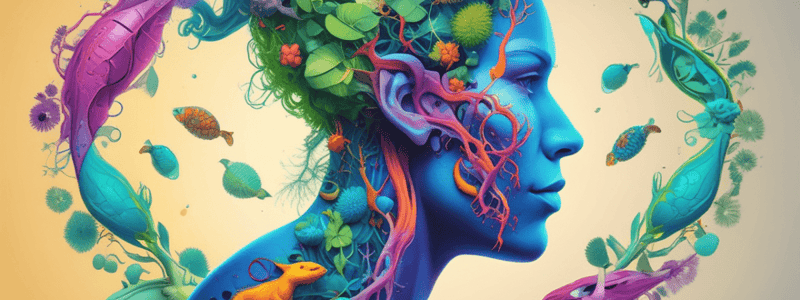Podcast
Questions and Answers
What is the main focus of biotechnology?
What is the main focus of biotechnology?
- Investigating meteorology and climate change
- Applying biological knowledge to develop new products and technologies (correct)
- Exploring the origins of life
- Analyzing geological formations
How have advances in genetics impacted biotechnological developments?
How have advances in genetics impacted biotechnological developments?
- They have led to a decline in biotechnological advancements
- They have only focused on environmental science
- They have no impact on biotechnology
- They have been crucial for biotechnological developments like genetic engineering and gene therapy (correct)
What is the significance of Mendel's principles in evolution?
What is the significance of Mendel's principles in evolution?
- They are equally essential as Darwin's theory of natural selection (correct)
- They play a role only in environmental science
- They are not important for evolution
- They are more important than Darwin's theory of natural selection
How does the interplay between genes and environments shape evolution?
How does the interplay between genes and environments shape evolution?
Which industry has been revolutionized by biotechnology?
Which industry has been revolutionized by biotechnology?
What is emphasized by the perspective that calls for a synthesis of evolutionary biology, genetics, ecology, and related fields?
What is emphasized by the perspective that calls for a synthesis of evolutionary biology, genetics, ecology, and related fields?
Which scientist proposed the theory of evolution in the mid-19th century?
Which scientist proposed the theory of evolution in the mid-19th century?
What foundational work did Gregor Mendel do in the mid-19th century?
What foundational work did Gregor Mendel do in the mid-19th century?
Which branch of biology is primarily concerned with the interactions of organisms with their environment?
Which branch of biology is primarily concerned with the interactions of organisms with their environment?
How did Mendel's principles of inheritance contribute to the discovery of DNA as the genetic material?
How did Mendel's principles of inheritance contribute to the discovery of DNA as the genetic material?
In what way did Darwin contribute to ecological thinking?
In what way did Darwin contribute to ecological thinking?
Which field of biology combines elements of Darwin's original theory with contemporary knowledge of genetics?
Which field of biology combines elements of Darwin's original theory with contemporary knowledge of genetics?
Flashcards are hidden until you start studying
Study Notes
Biologists' Contributions
Biologists have significantly contributed to various aspects of science, particularly in the fields of evolution, genetics, ecology, and biotechnology. Let's explore how these essential branches of biology have evolved and shaped our understanding of life and the natural world.
Theory of Evolution
The theory of evolution, proposed by Charles Darwin in the mid-19th century, explained how species evolve over time through natural selection. Darwin's groundbreaking work led to a fundamental shift in the scientific understanding of life. The concept of evolution has been refined over the years, leading to the modern synthesis, which combines elements of Darwin's original theory with contemporary knowledge of genetics.
Genetics
Gregor Johann Mendel's studies on pea plants in the mid-19th century laid the foundation for modern genetics. Mendel's principles of inheritance—which became known as Mendelian genetics—explained the transmission of traits from parents to offspring. These insights led to a better understanding of heredity and contributed to the discovery of DNA as the genetic material. Today, genetics plays a crucial role in medicine, agriculture, and numerous other fields.
Ecology
Ecology is the branch of biology concerned with the interactions of organisms with their environment. Darwin played a significant role in ecological thinking, as he recognized the importance of competition and cooperation within species. Modern ecology has expanded upon these concepts, incorporating broader perspectives on ecosystem dynamics and conservation.
Biotechnology
Biotechnology is the application of biological knowledge to develop new products and technologies. Advances in genetics have been crucial for biotechnological developments, such as genetic engineering, gene therapy, and targeted drug delivery systems. Biotechnology has revolutionized industries like medicine, agriculture, and environmental science.
Collaborative Evolution
Another important contribution from evolutionary biologists is the recognition that Mendel's principles are just as essential as Darwin's theory of natural selection. The interplay between genes and environments shapes evolution, with both having equal importance. This perspective emphasizes the need for a synthesis of evolutionary biology, genetics, ecology, and other related fields.
In conclusion, biologists' contributions across various branches of their field have led to tremendous advancements in our understanding of life processes and interactions with the environment. As we continue to explore and refine these concepts, we can expect even more significant insights into nature and its underlying mechanisms.
Studying That Suits You
Use AI to generate personalized quizzes and flashcards to suit your learning preferences.




